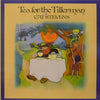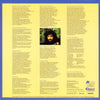





Cat Stevens – Tea For The Tillerman (200g)
Guitar, Keyboards, lead vocals – Cat Stevens [click here to see more vinyl featuring Cat Stevens]
Guitar [Second], backing vocals – Alun Davies
Double bass – John Ryan
Drums, congas, tambourine – Harvey Burns
Solo violin - John Rostein
Strings arranged by Del Newman
Written by Cat Stevens
1 LP, gatefold jacket
Original analog Master tape : YES
Heavy Press : 200g
Record color : black
Speed : 33RPM
Size : 12”
Stereo
Studio
Record Press : Quality Record Pressings
Label : Analogue Productions
Original Label : ABC
Recorded May–July 1970 at Morgan Studio (London), Island Studio (London), Olympic Studio (London)
Produced by Paul Samwell-Smith
Mastered and lacquer cut by George Marino at Sterling Sound
Executive Producer - Chad Kassem
Design by Junie Osaki
Front Illustration by Cat Stevens
Photography by Shep
Originally released in November 1970
Reissued in 2011
Tracks :
Side A:
-
Where Do the Children Play?
-
Hard Headed Woman
-
Wild World
-
Sad Lisa
-
Miles From Nowhere
Side B:
-
But I Might Die Tonight
-
Longer Boats
-
Into White
-
On The Road To Find Out
-
Father And Son
-
Tea For The Tillerman
Awards:
Rolling Stone 500 Greatest Albums of All Time - Ranked 205/500
Michael Fremer's 100 Recommended All-Analog LP Reissues Worth Owning - Rated 79/100!
The Audio Beat 2011 Recording Of The Year!
The Absolute Sound Super Disc List
Reviews :
“Mona Bone Jakon only began Cat Stevens' comeback. Seven months later, he returned with Tea for the Tillerman, an album in the same chamber-group style, employing the same musicians and producer, but with a far more confident tone. Mona Bone Jakon had been full of references to death, but Tea for the Tillerman was not about dying; it was about living in the modern world while rejecting it in favor of spiritual fulfillment. It began with a statement of purpose, "Where Do the Children Play?," in which Stevens questioned the value of technology and progress. "Wild World" found the singer being dumped by a girl, but making the novel suggestion that she should stay with him because she was incapable of handling things without him. "Sad Lisa" might have been about the same girl after she tried and failed to make her way; now, she seemed depressed to the point of psychosis. The rest of the album veered between two themes: the conflict between the young and the old, and religion as an answer to life's questions. Tea for the Tillerman was the story of a young man's search for spiritual meaning in a soulless class society he found abhorrent. He hadn't yet reached his destination, but he was confident he was going in the right direction, traveling at his own, unhurried pace. The album's rejection of contemporary life and its yearning for something more struck a chord with listeners in an era in which traditional verities had been shaken. It didn't hurt, of course, that Stevens had lost none of his ability to craft a catchy pop melody; the album may have been full of angst, but it wasn't hard to sing along to. As a result, Tea for the Tillerman became a big seller and, for the second time in four years, its creator became a pop star.” AllMusic Review by William Ruhlmann
Rating:
AllMusic : 5 / 5 , Discogs 4.59 / 5 , Analogplanet : Music 10/11, Sound 10/11

